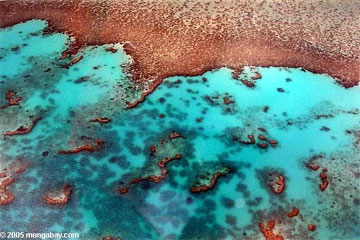Saving oceans from acidification requires addressing climate policy
Saving oceans from acidification requires addressing climate policy
mongabay.com
August 27, 2008
|
|
Ocean acidification driven by rising carbon dioxide emissions is a great threat to marine ecosystems and needs be addressed through climate policy and conservation measures, said top marine scientists meeting in Hawaii.
Members of the U.S. Coral Reef Task Force produced the “Honolulu Declaration”, a set of measures that can “increase the survival of coral reefs in an acidifying ocean.”
These include stabilizing CO2 emissions and reducing marine pollution; integrating climate change forecasts into marine protected area management; reducing outside sources of stress on corals, including overfishing and reef-damaging activities; expanding protected areas; and funding more research on the impact of ocean acidification and climate change on coral reefs.
“The reefs of the world are at risk, and are especially vulnerable to the rapidly emerging stress brought on by climate change,” said Rod Salm, director of tropical marine conservation for The Nature Conservancy’s Asia-Pacific program and presenter of the Honolulu Declaration. “Recognizing the potential irreversibility of ocean acidification impacts, it has never been more imperative to improve the management and adaptability of coral reef ecosystems.”
 Scientists meeting at the International Coral Reef Symposium in Florida earlier this year declared acidification the “largest and most significant threat” to oceans. |
“Coral reefs are at the heart of our tropics, and millions of people around the world depend on these systems for their livelihoods. Without urgent action to limit carbon dioxide emissions and improve management of marine protected areas, even vast treasured reefs like the Great Barrier Reef and Northwestern Hawaiian Islands will become wastelands of dead coral,” added Lynne Hale, director of The Nature Conservancy’s Marine Initiative.
Ocean acidification reduces the availability of carbonate ions necessary for the formation of shells and exoskeletons by marine organisms. Corals, marine plankton, and shellfish would be especially affected, although some research has suggested that even juvenile fish would suffer from higher-than-normal CO2 levels.
Should CO2 emissions continue at their current rate, scientists project that global ocean pH levels could drop from 8.1 today to 7.7 by 2100. The change would have a dramatic impact on sea life.
The signees of the Honolulu Declaration:
- Ken Anthony, Senior Research Fellow at the Centre for Marine Studies, University of Queensland
- Billy Causey, Southeast Regional Director for the Office of National Marine Sanctuaries of the National Oceanic and Atmospheric Administration (NOAA)
- Richard Feely, Senior Scientist and Supervisory Chemical Oceanographer at the Pacific Marine Environmental Laboratory of NOAA
- John Guinotte, marine Biogeographer at the Marine Conservation Biology Institute
- Gretchen Hoffman, an associate professor of ecological physiology of marine organisms at the University of California, Santa Barbara
- Jennie Hoffman, marine biologist and professor at the Ocean Research College Academy in Everett, Washington, and World Wildlife Fund consultant
- Paul Jokiel, Researcher at the University of Hawai‘i, Hawai‘i Institute of Marine Biology
- Joan Kleypas, Scientist, Institute for the Study of Society and Environment at the National Center for Atmospheric Research
- Paul Marshall, Climate Change Program manager of Australia’s Great Barrier Reef.
- Rod Salm, Director of Tropical Marine Conservation for The Nature Conservancy, Asia-Pacific Region (along with Elizabeth McLeod, Climate Adaptation Scientist for The Nature Conservancy, Asia-Pacific Region; Eric Conklin, Marine Science Advisor for the Hawai‘i Marine Program, The Nature Conservancy; and Annick Cros, Program Coordinator for The Nature Conservancy’s Asia-Pacific Region)
- J. Charlie Veron, Chief Scientist of the Australian Institute of Marine Science and the world’s foremost expert on coral reefs
Related
Carbon dioxide levels threaten oceans regardless of global warming
Rising levels of carbon dioxide will have wide-ranging impacts on the world’s oceans regardless of climate change, reports a study published in the March 9, 2007, issue of the journal Geophysical Research Letters The study, authored by Ken Caldeira from the Department of Global Ecology at the Carnegie Institution at Stanford University and Long Cao and Atul Jain of the University of Illinois, shows the increasing absorption of carbon dioxide is acidifying global oceans, putting sea life at risk.
Coral reefs decimated by 2050, Great Barrier Reef’s coral 95% dead
Australia’s Great Barrier Reef could lose 95 percent of its living coral by 2050 should ocean temperatures increase by the 1.5 degrees Celsius projected by climate scientists. The startling and controversial prediction, made last year in a report commissioned by the World Worldwide Fund for Nature (WWF) and the Queensland government, is just one of the dire scenarios forecast for reefs in the near future. The degradation and possible disappearance of these ecosystems would have profound socioeconomic ramifications as well as ecological impacts says Ove Hoegh-Guldberg, head of the University of Queensland’s Centre for Marine Studies.